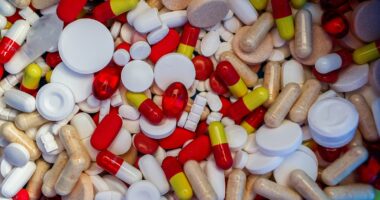Share this @internewscast.com
As we all aim for a peak state of health to enjoy life at its fullest, most of us are on the lookout for ways to stay fit and healthy.
A revelation from an oncology dietitian, however, has sent ripples across social media as she highlighted an often overlooked risk factor in the battle against cancer – one related to our daily beverages. Nichole, who shares her insights as oncology.nutrition.rd on TikTok, has disclosed that there’s a particular drink we should be wary of if we’re serious about reducing cancer risk, and it’s not your morning cup of coffee.
In one of her informative videos, Nichole addresses a prevalent myth about coffee consumption. With clarity and expertise, she enlightens her viewers and busts this widely held belief.
Nichole said: “As a cancer dietitian, I want to tell you that it is 100% ok to enjoy coffee. A lot of people are going to tell you that coffee is increasing cancer risk, and I’m telling you that it absolutely is not.
“Coffee is an amazing choice, and you should enjoy it. Yes, you want to not have it high in sugar or, you know, really fattening with a lot of cream, but it can absolutely fit in. It can absolutely be something to be enjoyed.”
However, Nichole points out another beverage that does pose a risk: alcohol. This fact comes underlined in the caption of her video itself.
While processed meats and alcohol have been confirmed to hike the risk of cancer, coffee is not believed to. Indeed, moderate caffeine intake, such as that obtained from coffee, has not been associated with increased cancer risk.
Intriguingly, some research suggests that coffee might actually offer a shield against certain cancers. While moderation is key, it’s perfectly acceptable to savour your cup of coffee as part of a well-rounded diet.
When it comes to alcohol and its link to cancer, Cancer Research UK has issued a stark warning – consuming alcohol does indeed heighten the risk of developing the disease. It’s not a certainty that alcohol will lead to cancer, but all alcoholic beverages are implicated in increasing this risk.
The reason lies in the inherent properties of alcohol, which can inflict harm even when enjoyed in moderation. The less alcohol you consume, the more you can diminish your chances of facing cancer.
Moreover, forgoing alcohol can yield additional health advantages. Reducing alcohol intake can decrease the likelihood of accidents, hypertension and liver ailments.
Alcohol consumption is associated with seven distinct types of cancer, including cancers of the breast, bowel, mouth, certain throat regions and liver. While drinking doesn’t guarantee a cancer diagnosis, it’s advisable to enjoy alcohol sparingly.
For those aiming to preserve overall wellness, the NHS provides straightforward guidance. According to their recommendations: “Men and women are advised not to drink more than 14 units a week on a regular basis.
“Spread your drinking over three or more days if you regularly drink as much as 14 units a week. If you want to cut down, try to have several drink-free days each week. 14 units is equivalent to six pints of average-strength beer or 10 small glasses of lower-strength wine.”

















